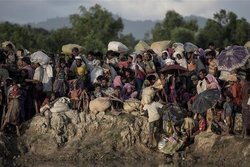 A United Nations (UN) human rights investigator stated that up to 10,000 civilians have been forced to flee their homes in Myanmar’s Northwestern state of Rakhine since November last year as a result of continued violence and a lack of humanitarian aid due to government restrictions.
A United Nations (UN) human rights investigator stated that up to 10,000 civilians have been forced to flee their homes in Myanmar’s Northwestern state of Rakhine since November last year as a result of continued violence and a lack of humanitarian aid due to government restrictions. RNA - Yanghee Lee, the UN's special rapporteur on human rights in Myanmar, made the revelation on Monday, calling on the UN Security Council to refer Myanmar to the International Criminal Court (ICC) over its atrocities against Rohingya Muslims and other ethnic minority groups in the conflict-ridden state, presstv reported.
"The situation in Myanmar must be referred to the ICC by the Security Council or a state party or group of state parties," Lee said, adding that, "Victims must not be forced to wait in purgatory of international inaction. If it is not possible to refer the situation to the ICC, the international community should consider establishing an independent tribunal."
Thousands of Rohingya Muslims were killed, injured, arbitrarily arrested, or raped by Myanmar's soldiers and Buddhist mobs mainly between November 2016 and August 2017, when the surviving members of the community started fleeing to Bangladesh en masse.
The Rohingya Muslims, who have lived in Myanmar for generations, are denied citizenship and are branded illegal emigrants from Bangladesh, which likewise denies them citizenship.
The United Nations has described the Rohingya as the most persecuted community in the world.
Partly because of the poor conditions in the camps, and partly because of the prospect of repatriation to Myanmar, the Rohingya Muslims have occasionally attempted to flee Bangladesh.
Bangladesh is currently hosting more than one million Rohingya Muslim refugees who have fled Myanmar’s deadly army crackdown and persecution since 2017.
The government in Bangladesh has for long been pushing a controversial plan to relocate thousands of Rohingya refugees to an isolated and flood-prone island in the Bay of Bengal, where they may be stranded forever.
Lee also expressed deep concern about Bangladesh’s plan to move 23,000 Rohingya refugees from camps in Cox's Bazaar to Bhashan Char Island in April, saying the island may not be “habitable” and that the relocation plan would create a potential "new crisis.”
The UN official paid a visit to the island in January.
"I had the opportunity to visit the island on my last visit to Bangladesh and saw with my own eyes the works that the Bangladesh government has undertaken. However, there are a number of things that remain unknown to me even following my report, chief among them being whether the island is truly habitable," Lee told the UN Human Rights Council on Monday.
"Ill-planned relocation, and relocations without the consent of the refugees concerned, have the potential to create a new crisis. It is incumbent on the government of Bangladesh to ensure that this is not brought about," she noted.
Bhasan Char, whose name means “floating island” emerged from the silt about 20 years ago and is located about 30 kilometers from mainland Bangladesh. The island is flat, shape-shifting, and inundated by regular floods during the months of June and September every year.
Humanitarian groups and aid workers have on numerous occasions lashed out at the relocation plan, saying the island is vulnerable to frequent cyclones and cannot sustain the livelihood of thousands of people.
847/940